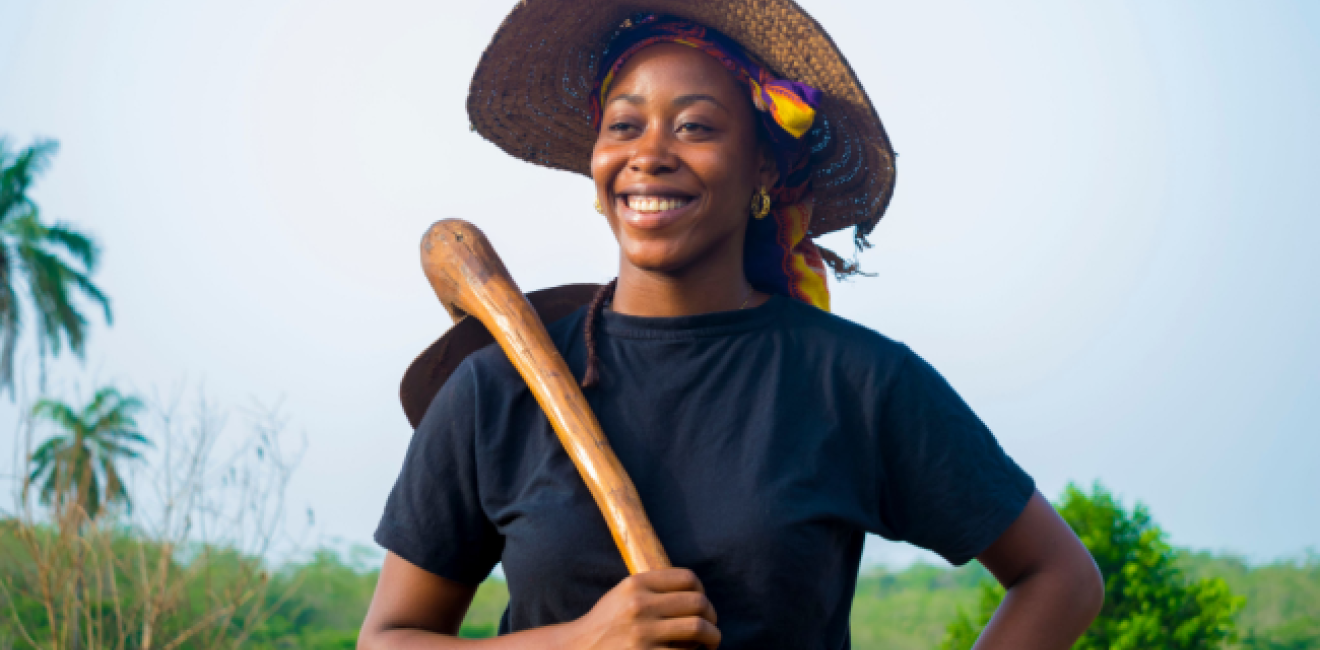
A blog of the Africa Program
In African countries, agriculture is the backbone of most economies, contributing about 25 percent to their Gross Domestic Product (GDP) yet it is dominated by smallholder farmers. Smallholder farms account for only 12 percent of the world's farmland, yet they provide an estimated 80 percent of the food produced in Asia and Africa. Although smallholder farmers play a key role in contributing to global food security, they are vulnerable and often neglected by policy strategies — leaving them poor and hungry. As a result, smallholder farmers increasingly face several constraints. They have limited resource endowment, and production systems which is marked by simple, outdated technologies, low returns, high seasonal labor fluctuations and further constrained by climate and market price fluctuations. Their outputs are often rain-fed with relatively small food volumes produced primarily for local consumption, although a few commodities may be marketed. Additionally, smallholder farmers are prone to a spectrum of emerging climatic, health, price, and financial risks.
Particular agricultural tasks are gendered so that male and female labor cannot be easily substituted. These constrain an already fragile food systems, and also make smallholders more risk-averse and contribute to persistent smallholder poverty. In most African countries, agriculture accounts for 70 percent of the labor force, and food supply is concentrated on about 33 million smallholder farms. Women are in the frontline and comprise an average of 62 percent of the agricultural labor force doing the bulk of the work to produce, process, and market their produce. Women smallholder farmers perform farm work as well as domestic work; therefore, they cannot have the same agricultural productivity as men because of their household and societal obligations. In some traditions, certain agricultural activities such as slashing, ploughing, and spraying are done by males, without which women farmers face delays that may lead to losses in output.
Systemic Barriers to Women Smallholder Farming
Smallholder farmers face several barriers worldwide. Due to the lack of access to solutions needed to overcome these challenges and grow enough food to support their livelihoods, they often find themselves trapped in a vicious cycle of low-intensity, subsistence-oriented farming, resulting in low yields and insufficient profits to make beneficial investments. These elements contribute to high levels of poverty across many rural areas. Due to lack of skills, technologies and financial services, women smallholder farmers may face higher risks to be able to produce types, quality, and quantity of commodities required by markets.
Furthermore, women smallholders in Africa encounter additional constraints and limitations. They have less access to the productive resources and services required by agricultural producers. They are less likely than men to own land or livestock, adopt new technologies, use credit or other financial services, or extension advice. They are in many cases deprived of land ownership, access to markets, key assets and inputs, and are frequently left out in decision-making processes. Moreover, these women provide unpaid farm labour while remaining subject to their reproductive roles including domestic duties within both the household and their communities.
Women have less access to adequate education and healthcare and are also disproportionately impacted by poverty and hunger. Social norms systematically limit the options available and the gender asset gap reduces their agricultural productivity. Moreover, women's discrimination and low levels of human capital are restrictive, meaning that their time commands a low return compared with that of men. Reports indicate that women account for nearly half of the world's smallholder farmers and produce 70 percent of Africa's food, yet women own less than 20 percent of land in the world.
While extension services in Africa remain low for both genders, women tend to make less use of them than men. Rural women may face barriers in accessing information via technology because of their limited education, financial and time constraints. Without access to credit, producers are unable to bear the risks and up-front costs associated with the innovations and investments necessary to enhance their productivity, income, and well-being. In Africa, women usually have almost no control of assets such as collateral and household property. Moreover, several hindrances lead to gender inequalities in access to and adoption of new and existing technologies and their adoption may be constrained by women's lower ability to absorb risk.
Implications of Poor Performance of Women Smallholder Farming
Empowering and supporting women smallholder farmers is an essential mechanism to increase Africa's food supply, a key agenda of African and international policymakers. However, dwindling agricultural output is a major driving force behind growing poverty, increased vulnerability, and food insecurity among African smallholder farmers. Culturally, women have wide indigenous knowledge of local plant species; therefore, they can provide a wide variety of nutritious food for their families, increasing dietary diversity and curbing malnutrition at household level. This means that by continuing to marginalize women, societies are propagating low diversification in food production and food intake, hunger, and malnutrition. In addition, the changing nature of food supply chains — reflected by the rise of supermarkets rather than providing new opportunities for smallholder farmers — may also marginalize them by isolating them from profitable markets.
Strengthening Women Smallholder Farming
Through the Malabo Declaration and the Comprehensive Africa Agriculture Development Programme (CAADP), the African Union has pledged to increase support to women smallholder farmers — although several African countries are yet to meet this target. Policies and programs by African governments and development partners have not adequately prioritized women smallholder farmers. As a result, smallholder farmers have to endure the undesirable consequences of governments' lack of support and commitment. Previous assessments of large populations' food security marginalization in Africa indicated that the main hindrances were access and inequality, yet policy discussions have focused on production. Women have not been a high priority, and even efforts that emphasized gender equality, such as the World Bank's Group of 20 (G20) and the US Government's Feed the Future initiative, have had limited impacts because they focused on "market-ready" farmers — who are usually male. Furthermore, measures used by governments in order to increase access to food do not reach all vulnerable people and efforts to support farmers' access to inputs and credit additionally left out economically "non-viable" smallholders.
The UN and development partners have continued to advise African governments to formulate policies and put in place reforms that address gender inequalities. While there are some steps being made toward the betterment of women smallholder farmers, several factors still hinder innovations in agriculture to work for women smallholders. Lack of an enabling environment and political will, compounded by advancement of immediate development solutions, have left smallholder farmers impoverished and food insecure. Strengthening women smallholder farmers is a critical component in efforts to improve food security in Africa. Policymakers should develop or implement national plans to scale-up sustainable support to women smallholders and to create an enabling environment. African governments should also ensure that the targets of the Malabo Declaration are met as well as enforce existing policy actions geared towards empowering and strengthening smallholder women farmers.
Dr. Florence Odiwuor is a Lecturer at the School of Agriculture, Natural Resources and Environmental Studies at Rongo University, Kenya. Her teaching work is centered on sustainable food value chains, food supply chains, food security, post-harvest systems, public-private partnerships, and project planning and management. She is a Southern Voices Network for Peacebuilding (SVNP) Scholar during the summer (May to August) 2022 term at the Woodrow Wilson International Center for Scholars in Washington, D.C.
Photo credit: A young African lady working on a farm by vic josh/Shutterstock.com
The opinions expressed on this blog are solely those of the authors. They do not reflect the views of the Wilson Center or those of Carnegie Corporation of New York. The Wilson Center's Africa Program provides a safe space for various perspectives to be shared and discussed on critical issues of importance to both Africa and the United States.
Author

Lecturer, School of Agriculture, Natural Resources and Environmental Studies, Rongo University, Kenya

Africa Program
The Africa Program works to address the most critical issues facing Africa and US-Africa relations, build mutually beneficial US-Africa relations, and enhance knowledge and understanding about Africa in the United States. The Program achieves its mission through in-depth research and analyses, public discussion, working groups, and briefings that bring together policymakers, practitioners, and subject matter experts to analyze and offer practical options for tackling key challenges in Africa and in US-Africa relations. Read more

Explore More in Africa Up Close
Browse Africa Up Close
The Innovative Landscape of African Sovereign Wealth Funds



